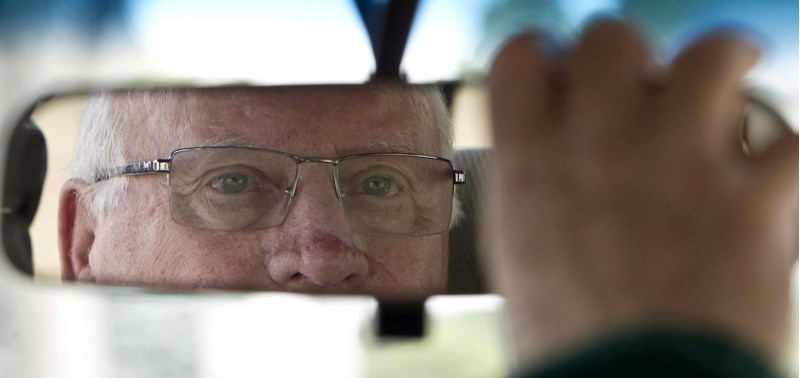It was a rainy August afternoon when Irene Crowe's husband Larry went out to search for their lost dog.
He took the car to drive around the neighbourhood. When he didn't return several hours later, Irene knew something was wrong.
The police found him later that night in Drayton Valley, his car pulled over in a ditch.
"He was driving and got lost and went onto a back road … he had no gas so he couldn't get home," recounts Irene.
Larry, 68, doesn't remember much from that night, only that he laid down in his seat when he ran out of gas. He was admitted to the Drayton Valley Hospital overnight.
"The doctors thought it was a stroke," says Irene. "They didn't find anything but they took (his licence) away anyways."
In Alberta, a form signed by a doctor is required when drivers wishing to renew their licence turn 75 years old, again at 80 and every two years after that.
Doctors are not legally required to report medically at-risk drivers to Alberta Transportation, but can recommend medical tests and a road test to assess driving ability. By law, drivers are obligated to disclose medical conditions that may affect their ability to drive when they renew their license.
Loss of a driver's licence is not age defined, says Lori Jack, seniors nurse with the St. Albert & Sturgeon Primary Care Network.
"Ninety-year-olds can be completely safe drivers," she says.
Jack is one of the facilitators for the driving cessation support group held at the St. Albert 50+ Club. Primary Care Network, the Medically At-Risk Driver (MARD) Centre and researchers from the University of Alberta collaborated on the free program.
Patients and their caregivers attend separate – but simultaneous – groups once per week.
The group aims to help people cope with the loss of their driving privileges, usually because of chronic disease and progressive dementias such as Alzheimer's disease.
‘Fired' from driving
The loss of Larry's driver's licence has been especially difficult on the Crowes since Irene doesn't drive either.
It's frustrating and unfair, says Larry.
"It builds and builds in you because when you're driving … it's independence, you can get up and go and you don't have to ask anybody," adds Irene.
Many feel the driving assessments and evaluations are unfair. Facilitators were unprepared to hear such strong emotional responses in the support groups, acknowledges Jack.
Most individuals feel they have been "fired" from driving, considering they otherwise have a good driving record.
"Angry or frustrated, the hostility really showed. Seniors feel they are targeted. They feel like they are criminals," says Jack.
Losing your driver's licence is one of the most difficult aspects of being diagnosed with dementia. The development of the support groups, first in Edmonton and then in St. Albert in 2012, were based upon that recognition, says Bonnie Dobbs PhD, director of the MARD Centre and one of the program's developers.
"Having to physically move from the driver's seat into the passengers seat is very difficult."
"Most of us prepare for our retirement from work, very few prepare for retirement from driving," she says.
That transition is especially difficult for men, since many in the current group of participants identify driving as their "job." Women are more likely to voluntarily give up their driver's licence, explains Dobbs.
Loss of driving privileges also puts a considerable strain on caregivers.
"Often the person gets up in the morning and starts talking about the loss of their driving privileges, they go to bed and they're still talking about it. It's a huge stressor and it's a stressor that the caregiver can't do anything about," says Dobbs.
Loss of a driver's licence is an unchangeable stressor. Rationalizing with the individual about why they can no longer drive doesn't work, she explains.
Patients often suffer from impaired judgment and don't recognize the problem, adds Jack, which creates strain in relationships with caregivers.
Coping effectiveness is one of the strategies taught in the driving cessation support groups. Caregivers are taught to break stressors down into changeable and un-changeable categories, explains Dobbs.
The way to deal with unchangeable stressors is to talk about emotions, not rationalize.
A new normal
Data from the first three sessions of the support group show that for 100 per cent of the patients, the support group helped them cope with not driving.
For caregivers, 60 per cent said the groups helped them cope with their family member not being able to drive, helped them talk to their family member about driving and helped their family relationship.
Attending the support groups has taught Irene how to better express her feelings.
"You have to be very patient … if you get mad it doesn't help the other person," she says.
But the burden of living without a vehicle still proves to be frustrating, even though the Crowes live relatively close to grocery stores and their family doctor.
"It's hard because you can't get around. You have to take a bus or a cab most places and it's very expensive," says Irene.
Dobbs believes the support groups will become a critical community resource as the number of people with dementia increases over the next 30 years.
"Two-thirds of people in the early stages of dementia are unsafe to drive. At some point every person with a progressive dementia is going to have to move to the passenger seat," she says.
Dobbs is currently looking for a centralized home in Edmonton for the support groups so they can continuously run as early as 2015.




